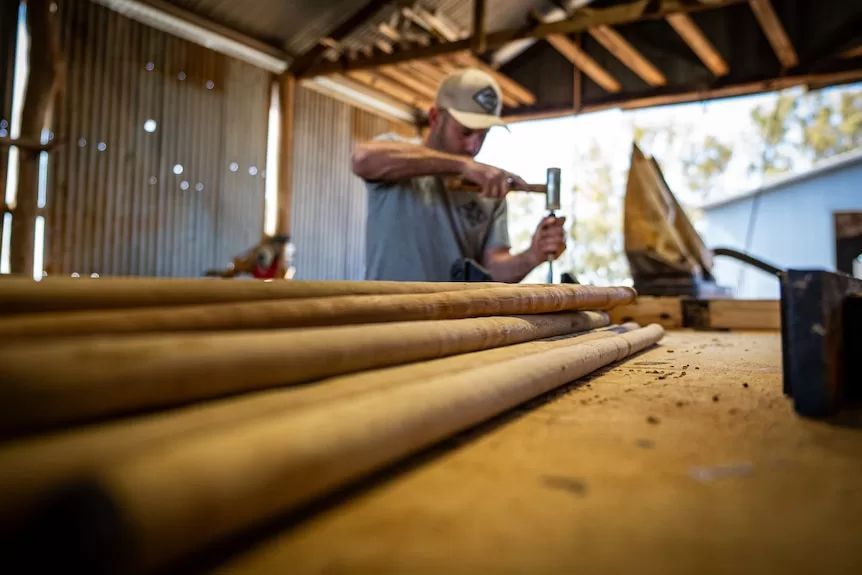The old, wooden, wool-sorting table gathering dust in the corner of the shearing shed could be worth thousands of dollars, even if its working life is over — or it’s in pieces.
Queensland country carpenter Jason Porter has a 12-month waiting list to restore these broken-down tables.
Some are so far gone Mr Porter only has the dowels or slats to work with.
Combining old-school carpentry skills and modern woodworking equipment, he gives them new life and purpose as glass-topped dining tables.
“When they come in they’re as rough as guts and you turn them around and go, ‘Wow, that’s gone from being in a wool shed to now a dining piece,'” he said.
“The fellow who made it back in the day, would have laughed at me.
“If he had a time machine he’d say, ‘These were never going to be dining tables mate!'”
Mr Porter grew up on the family cotton farm at Cecil Plains, three hours west of Brisbane.
But life on the land wasn’t for him.
He headed to the city, graduated with a business degree and worked in events management. Disillusioned and broke, he returned home a few years later and started making dog kennels for sale, much to the surprise of his parents Brett and Louise.
“At school he did manual arts, and his first job was a dustpan in metalwork, and when it came time to give him a mark the teacher got the dustpan and swept off his bench and went over to the bin and tipped the lot in,” laughed dad Brett Porter.
“And I thought, ‘Well, he’s not going to do anything with his hands this boy.'”
But now he’s a qualified carpenter and has taken over one of the farm workshops.
Some tables sent to him to restore are more than 100 years old and come in all shapes, sizes and styles.
Mr Porter starts with what he calls “the Ikea phase”.
“I pull the table apart, so basically it’s in flat-pack form, then I put it through my planer, my jointer and my thicknesser to square it all up again, so it comes back together better than it ever did before,” he said.
“The most time-consuming part is cleaning up the slats or dowels covered with decades of lanolin grease to freshen it up and make it look new again.
“I’ll get a lot of the older fellas and bushies and they’ll say, ‘Nah, they never made it with slats, mate, they always used dowels.’
“But I can tell you now I’ve had so many different ones and no-one followed a code back in the day.”
‘We sit around it every night’
Mr Porter’s customers are mostly families with a wool-industry connection, prepared to entrust him with a precious piece of their farming history.
“It’s an heirloom, something they can keep in the family and can hand down to their kids, that’s my main objective,” Mr Porter said.
Cecil Plains farmer Tim Clay has one of Mr Porter’s first restorations, a long-retired wool table he found in his mother’s pottery shed.
“I just thought it would be a great family heirloom to keep passing down — it’s fantastic, we sit around it every night,” Mr Clay said.
“I hope it lasts forever, but yeah, it’ll last me out anyway.”
Mr Porter insists he’s a craftsman, not an artist.
“I’m just doing something pretty basic, but I’m doing it well,” he said.
Rugby league great Shane Webcke, who represented Queensland and Australia, bought two tables at auction in Victoria for Mr Porter to restore.
“People should not throw them away, there’s actually a financial value to them, like a very big financial value to them, but there’s also the intrinsic value that that piece of our history doesn’t get wasted,” Mr Webcke said.
Mr Porter’s goal is to expand his business so he can hire a worker to whittle down his customer waiting list and boost Cecil Plains’ population of 300.
“I want to be able to put someone or put a family in our town to say, ‘Look, I brought another family to Cecil’,” he said.
“So that’s where I’m headed now.”
Watch this story on ABC TV’s Landline at 12:30pm on Sunday, or on iview.
Loading
